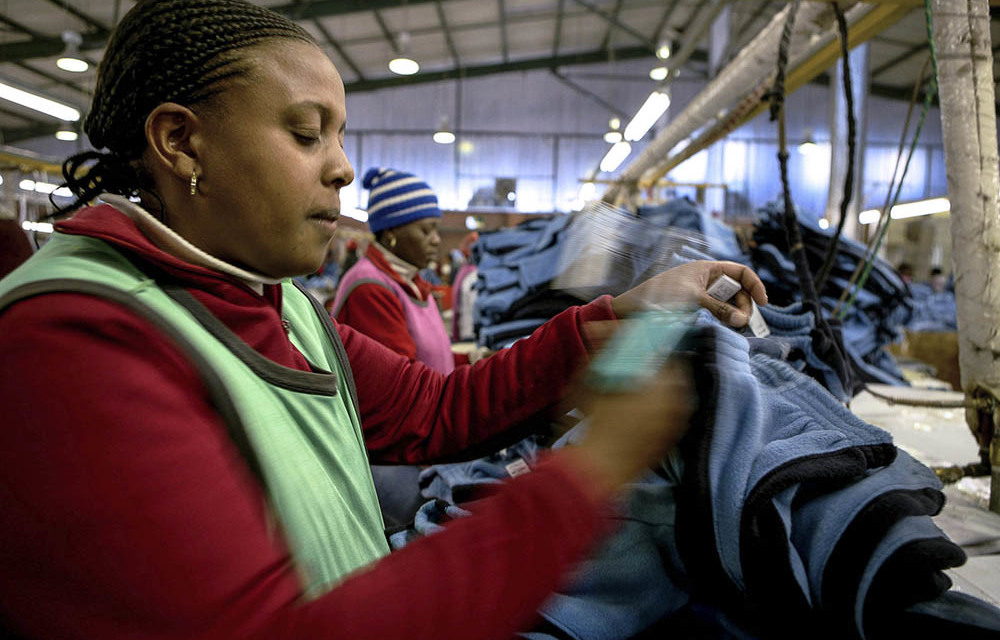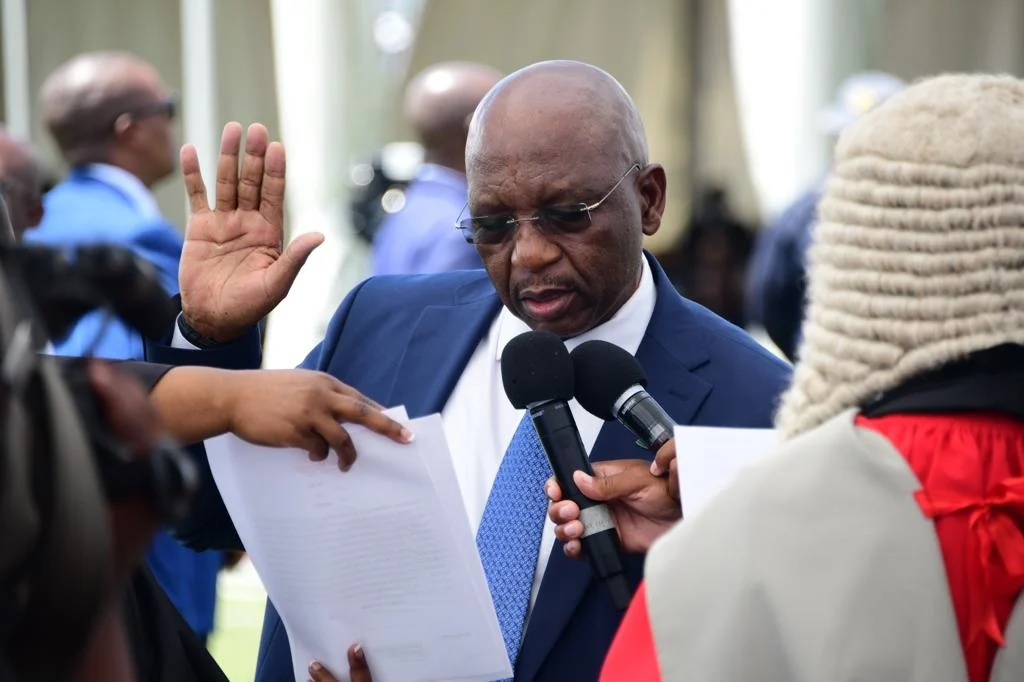Politics of power-brokering, power-sharing, trading positions and changing power relations, resulting in a re-organised Government
The recent episode in the political minefield of Lesotho has seen massive political agitation towards power sharing, power brokering and the re-sharping and re- organising of RFP-led government.

Mr Mzimkhulu Sithetho
Managing Director of the Governance Institute for Sustainable Development and Editor-In-Chief of thizkingdom.com

In the process, national reforms suffered another blow as they were pushed under the carpet. There was clear polarization of the political society, with a spillage into the general society. The monolith of power created around the ruling RFP and its allies after the 2022 election was shaken. There was trading in of posts, promises of government positions, resignations and other shenanigans on the political stage.
At the heart of it all was power-sharing, change in the power relations, and an attempt to reshape and re-organise the ‘Government’ to respond to the new tide of political agitation. Posturing and positioning were the order of the day and the mandate of the people was completely forgotten and thrown into oblivion. Questions abound; when will Lesotho mature from petty politics of opportunism and grow into politics of development? While the chess game took center-stage, much Judas-ism, betrayal and backstabbing were the order of the day.
Power brokering and power sharing
There clearly were no reasons why there was a motion of no confidence on the Government, maybe until it was discussed in parliament. But the proposers and seconders have not advanced any reasons why they felt that the current Government had lost the confidence of Members of Parliament in the National Assembly, mind you, ‘not of the voters.’ After all, the RFP-led government had just settled in office and was only beginning to take one foot step towards implementing their programme. They had just shown their interest in taking the national reforms forward. It has become clear after the Basotho Action Party (BAP), which has now forged links with the Government about the intent of the motion, as the BSP was part of the opposition bloc, which is vying for the fall of the RFP and its alliances.
At the centre of the quagmire is power sharing, on both sides of the political divide. While the RFP-aligned bloc sought to hold on grip and do whatever it took to remain in power, the opposition bloc too, did not leave any stone unturned to unseat them. It was a battle of the titans. At the heart of it all was the ‘tyranny of numbers.’ Numerical strength in the National Assembly was all that mattered as it was a determining factor. Calculators, be it of phones, computers and the actual ones, had a job as the quest was how much does each side have. Even a simpleton who never cared about partisan politics wanted to know ‘what the numbers say’ in the National Assembly on both sides of the political aisle. Different methods were used by either side of the political aisle to garner the numerical strength to remain or form a new government. The opposition side, standing on one polar end, which ignited the whole fracas, depended on keeping their MPs intact in the National Assembly.
At the same time, they were tirelessly courting the disgruntled MPs on the governing side. Surely, there were displeased MPs from the governing side, who now, were on the verge of beingin opposition’s fold. That was the undoing of the RFP and its alliances on the governing side - dissatisfied and renegade MPs. It was whispered that there had been trading of parliamentary seats for money. One MP, whose support for the governing side had remained unwavering, confirmed to have been courted and promised a briefcase of no fewer dollars. The opposition side’s source of funding to sponsor the trading-in-seats project was whispered to have come from a prominent business man who chose to keep a low profile. However, the opposition’s room to maneuver was limited to dolling out cash to lure the displeased RFP’s MPs to their fold. What they could only do was to promise them green pastures if they succeed to cross the Rubicon. It depended on whether those courted could pin their hopes on a probability and cede their parliamentary seats. They would cunningly play their cards by making meaningful demands as that went with taking risky decisions of ceding alliance with the RFP.
Also, convincing the voters at the constituencies as well as surviving the public disdain of perceived traitor ship high a risk to take on their side. Meanwhile, the governing side had delayed to convince its bloc to remain intact, but came in late in the day to apply the same tactic. As it is expected, the governing side has a greater political space to maneuver than the opposition. It had the instruments of power - the army, the police and intelligence, the whole security brigade was in its side. By the way, this did not waste any time to overtly lend that support. It faced fierce opposition and scolding across the spectrum. On top of that, the governing side had the diplomatic missions abroad at its disposal to use as bait for amassing the dwindling support. Least to say, the ministerial portfolios, which had been fortunately whittled down in terms of cabinet size (from 36 to 15) came in handy to rescue the RFP-aligned political bloc.
At least the ruling elite enjoyed a number of pathways from which to choose in order to throw the challenge of numerical stamina out of the window. One commentator, who is a friend of mine, had jocularly remarked that ‘the ruling elite could have been politically unintelligent to be overpowered by the opposition when they have a lot of room to maneuver.’ Immediately, a power- sharing scheme was put on the table, I recalled that light moment I had with my friend. That moment of truth finally came, and it became clear that the only solution to dilute the opposition’s perceived numerical strength was to renege on the promise of reducing an overblown cabinet for the benefit of the nation. That moment of truth meant the ruling elite had to swallow the pride and come to practicality - release the cabinet portfolios and trade them for parliamentary seats in the National Assembly. It took a few hours, the governing side’s numbers went to a high of 67, giving them relative comfort of only been able to rule as a simple majority Government. However, it still needed the support of the now unhappy opposition side to pass constitutional amendments that require a two-thirds majority.
'Politicians cross a river when they get to it. That said, for now, the governing side is comfortable about remaining in the ruling side of the aisle. The issue of two-thirds majority and others will be determined as the political journey unfolds. It was indeed a learning curve for the relative politically naïve RFP. As efforts were frantically being made to solve the political impasse and consolidate power in the last month, there was shortage of strong power brokers to influence either side. If indeed there were strong political middlemen, impasse could have not taken too long to break. It meant that the involved parties were partaking both as power holders and power brokers, a fit that had a heavy toll on them.
Historically, civil society honchos and faith-based big shots used to navigate working solutions that safeguarded peace and stability for the benefit of the nation. They used to mediate the talks and engage all by bringing them to a discussion table for navigation of a solution. No longer the situation today, as the CSO chief negotiators have joined the partisan bandwagon. They have deepened their hands in the pie and have since been subsumed into the political elite.
New power relations created
The power brokerage and sharing that has been sealed by a new coalition Government now has seven parties forming the government - BAP, MEC, DC, LCD, UFC, HOPE and LPC. Power relations have changed from three frontline parties forming Government, supported by four others on the periphery to seven parties in the coalface of Government. BAP is now the kingmaker with six seats, which changes the balance of forces on both sides. While it increases and bolsters the numerical strength of the governing RFP-aligned side, it also weakens the DC-led opposition side. This is politics at its best, a game of interests. Nonetheless, the change of power relations has other implications on the realignment in the Government. Those ministries that had been amalgamated into others are again going to be dismantled into a different rearrangement. The posture of previously opposed MPs in the National Assembly (BAP) is now in favour of the sitting Government. The motions, if any, which the BAP had lodged or supported against the RFP-aligned faction, will now have to fall off. If there are any court cases lodged against the RFP and its former allies, they have to be withdrawn or the courts will naturally deem them to have fallen off the court roll. Once any person goes into bed with another, allegiance goes full-scale. But given Lesotho’s volatile political climate, anything is possible.
There are however, subtle fears from outsiders, who pike their noses into the affairs of the governing body. They critique the new political set-up as marriage of convenience that will not last long. Some posit that the RFP’s undertaking to form a political marriage with the BAP is not a wise decision. The discussion now moves from the concept to the individuals. To make matters worse, the cynics and skeptics land their weight on the state of opportunism that they find at stake in the whole arrangement, decrying it as a short-term honeymoon, which will vanish like mist when the sun shines. Reshaping and re-organising ‘the Government’ in a bid to stabilize it ‘in
parliament’ There is no doubt that the RFP and its allies found themselves in a corner and after exploring all avenues to come out of the quagmire, found themselves with the option. They had to choose between allowing a DC-led coalition government seize the reins under their very nose and wait for 2o27 elections or to seize a bull by its horns by selling their souls to regain the glory conferred on them in 2022. Indeed, the last option seemed viable for the RFP and its allies under the circumstances. They had to swallow their pride of maintaining a high moral ground after a near landslide in the 2022 national elections. This has meant that the Government has been re-organised with more ministries being added, while some had to be dismantled from the old set-up after the 2022 national elections.
A reshaping has had to happen, now that newcomers, who did not share a similar political ideology with the RFP, have joined the bandwagon. It depends on whether the newcomers would toe the line set by the RFP, or would remain intransigent and stick to their guns. Either way spells disaster equally for the RFP and the BAP. It also depends on whether the RFP’s ideological underpinning of driving an economic revolution based on meritocracy will not be diluted by the coming of newcomers. Too many cooks spoil the broth, they say.
Political implications in the long-term
Just the taking of the decision to increase the cabinet even by one ministry, broke the monolithic architecture that the RFP and allies had sold to the nation and appeared to be a welcome decision, even among development partners. Political pundits argue that the RFP’s internal wrangling and jostling for a share in the cake will intensify.
This is given the fact that those who had been pinning their hopes on the opportunity that would come their way if a cabinet reshuffle is done or any possible change. Now their hopes are shattered. More seriously is the naked fact that MPs who had won constituencies where BAP MPs had contested, who are now members of the team have bypassed the owners of the house who are seated in the sitting room. They have gone to the bedroom by occupying cabinet seats when they had lost elections, to the same people who are pushed to the margins of society.
Most Read
New coalition government-in-waiting unveiled

The cooling of the political temperatures came with the BAP joining the bandwagon after a season of political agitation and chess games, reflecting political anomalies in the system of political governance of Lesotho:

A Comprehensive Analysis of Lesotho's Textiles and Garment Sector

Related Stories
A bipartisan arrangement is ideal for the reforms:

The Lusaka Declaration 2023 at a glance:

The opportunistic character of Lesotho’s politics foils a no-confidence vote:

Opinion Vote Polls
Do you think the existing government is going in the right direction to benefit the people of the country?
Subscribe for your daily newsletters
Enter your email to subscribe to our newsletter.

